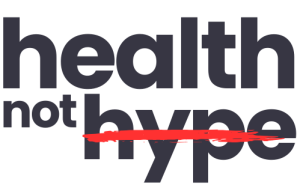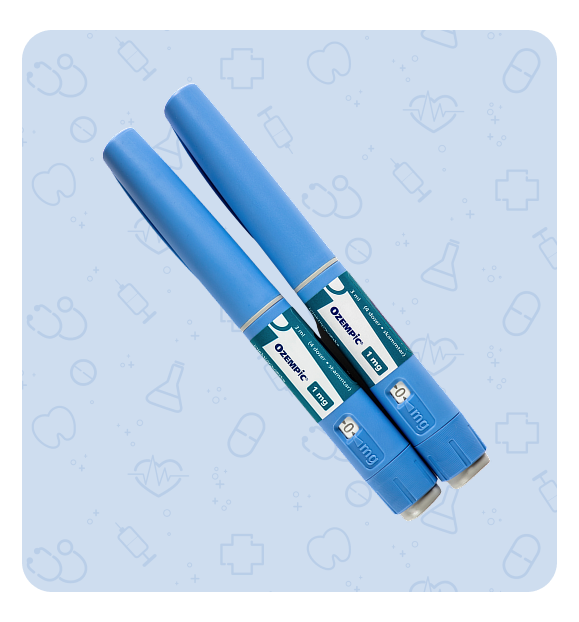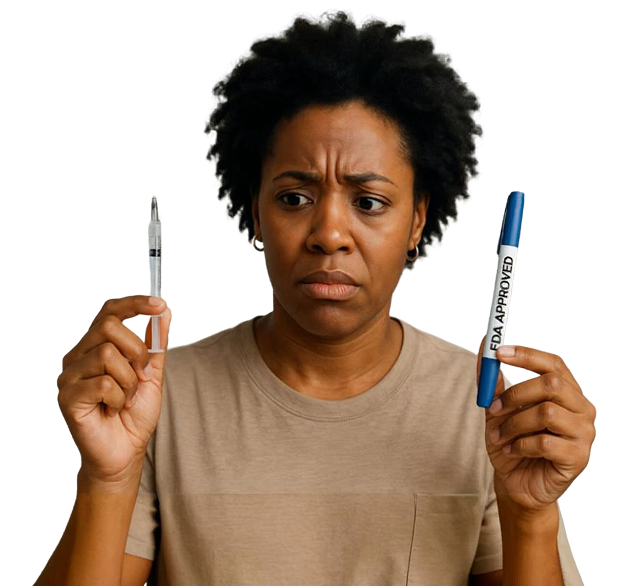








Glucagon‑like peptide‑1 (GLP‑1) medications help regulate blood sugar, appetite, and digestion. They’re prescription‑only therapies that, when clinically appropriate and combined with lifestyle supports, can lead to meaningful and sustained weight loss and reduce cardiometabolic risk. Most are once‑weekly injections delivered via pre‑filled pens. These medicines must be prescribed and monitored by licensed clinicians.
At a glance:

Many users lose 5–15% of their body weight over a few months (some dual-target agents report even more).

Evidence, such as the SELECT trial, shows semaglutide can significantly reduce cardiovascular events in people with overweight/obesity and heart disease.

Always use FDA-approved products purchased via licensed pharmacies—counterfeit and compounded versions pose serious safety risks.
GLP-1 medications represent one of the most significant advancements in the treatment of type 2 diabetes and obesity in decades, but their rapid rise in popularity has created a complex landscape for patients, providers, and policymakers. For individuals seeking reliable care, misinformation, unregulated compounded products, and counterfeit medications pose real risks to safety. At the same time, high costs, limited insurance coverage, and systemic inequities mean that many people who could benefit from these therapies still lack access.


The FDA has flagged counterfeit Ozempic and unapproved GLP-1s in the U.S. supply chain. Authorities even launched a “Green List” to curb illegal imports.

In adults with cardiovascular disease who are overweight or obese, semaglutide lowered rates of heart attacks and strokes (SELECT trial).

Surveillance data shows obesity prevalence remains highest in underserved communities—making safe access essential for equitable care.
*From Instagram ads to wellness shop pop-ups, Americans are being targeted with illicitly compounded GLP-1 weight-loss drugs—marketed under names like semaglutide or tirzepatide but produced in unregulated facilities. These fake treatments put lives at risk. Don’t fall for counterfeit treatments. Learn the truth about weight-loss medications—and how to stay safe.Source: FDA
Take Action
Demand safe & affordable access
Report a Scam
Submit suspicious product
Share Your Story
Join our digital storytelling series
Fake products can contain the wrong ingredient or the wrong amount of drug, be contaminated by poor manufacturing practices, and come with vague or misleading labels that make safe dosing impossible. Multi‑use vials that require you to self‑measure doses are especially risky and have led to overdoses and hospitalizations. If anything about the product, packaging, or seller feels off, do not inject it—contact a licensed pharmacist or your prescriber right away and report the incident to FDA MedWatch.
Fake products can contain the wrong ingredient or the wrong amount of drug, be contaminated by poor manufacturing practices, and come with vague or misleading labels that make safe dosing impossible. Multi‑use vials that require you to self‑measure doses are especially risky and have led to overdoses and hospitalizations. If anything about the product, packaging, or seller feels off, do not inject it—contact a licensed pharmacist or your prescriber right away and report the incident to FDA MedWatch
Fake products can contain the wrong ingredient or the wrong amount of drug, be contaminated by poor manufacturing practices, and come with vague or misleading labels that make safe dosing impossible. Multi‑use vials that require you to self‑measure doses are especially risky and have led to overdoses and hospitalizations. If anything about the product, packaging, or seller feels off, do not inject it—contact a licensed pharmacist or your prescriber right away and report the incident to FDA MedWatch
Fake products can contain the wrong ingredient or the wrong amount of drug, be contaminated by poor manufacturing practices, and come with vague or misleading labels that make safe dosing impossible. Multi‑use vials that require you to self‑measure doses are especially risky and have led to overdoses and hospitalizations. If anything about the product, packaging, or seller feels off, do not inject it—contact a licensed pharmacist or your prescriber right away and report the incident to FDA MedWatch
Oct 2024:
FDA determined the tirzepatide shortage resolved, with short grace periods for compounders.
Feb 2025:
FDA determined the semaglutide shortage resolved and set grace periods to prevent treatment disruption.
April–May 2025:
Grace periods ended (503A pharmacies/physicians by April 22, 2025; 503B outsourcing facilities by May 22, 2025). After these dates, routine compounding of “essentially copies” of approved semaglutide/tirzepatide is no longer permitted.
Sept 2025:
FDA launched a “Green List” import alert to block illegal/poor‑quality GLP‑1 APIs from unverified foreign sources while allowing compliant API manufacturers.
Compounded GLP‑1s may only be prepared under narrow conditions (e.g., a specific medical need not met by an approved product).
Bulk API from unverified foreign suppliers can be detained at the border; products labeled “research use only/not for human use” are not appropriate for patients.

Using salt forms (e.g., semaglutide sodium/acetate) is not equivalent to approved drugs and should not be used for compounding.